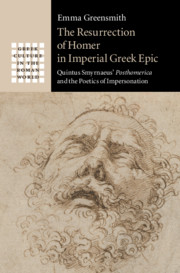 The Resurrection of Homer in Imperial Greek Epic
The Resurrection of Homer in Imperial Greek Epic Book contents
- The Resurrection of Homer in Imperial Greek Epic
- Greek Culture in the Roman World
- The Resurrection of Homer in Imperial Greek Epic
- Copyright page
- Dedication
- Contents
- Figures
- Acknowledgements
- Editions, Translations and Abbreviations
- Chapter 1 Beginning Again (Introduction)
- Part I Quintus as Homer: Illusion and Imitation
- Part II Quintus as Quintus: Antagonism and Assimilation
- Chapter 4 When Homer Quotes Callimachus
- Chapter 5 Selective Memory and Iliadic Revision
- Chapter 6 Prodigal Poetics
- Chapter 7 Temporality and the Homeric Not Yet
- Bibliography
- Index Locorum for Resurrection of Homer
- Subject index for Resurrection of Homer
Chapter 7 - Temporality and the Homeric Not Yet
from Part II - Quintus as Quintus: Antagonism and Assimilation
Published online by Cambridge University Press: 23 September 2020
- The Resurrection of Homer in Imperial Greek Epic
- Greek Culture in the Roman World
- The Resurrection of Homer in Imperial Greek Epic
- Copyright page
- Dedication
- Contents
- Figures
- Acknowledgements
- Editions, Translations and Abbreviations
- Chapter 1 Beginning Again (Introduction)
- Part I Quintus as Homer: Illusion and Imitation
- Part II Quintus as Quintus: Antagonism and Assimilation
- Chapter 4 When Homer Quotes Callimachus
- Chapter 5 Selective Memory and Iliadic Revision
- Chapter 6 Prodigal Poetics
- Chapter 7 Temporality and the Homeric Not Yet
- Bibliography
- Index Locorum for Resurrection of Homer
- Subject index for Resurrection of Homer
Summary
Confronts the synchronic model of time which underpins Quintus’ whole interval poetics and approach to Homer. Analyses the key narrative features of time in the poem: pacing, counterfactuals, anachronies and motifs of closure. Proposes that Quintus draws on the two different narrative forms offered by the Iliad and Odyssey and radically recombines them into one. Given the political dimensions attached to these forms, the chapter ultimately suggests the ideological implications of this technique. By merging teleological and open narratives, Quintus creates a positive reading of the ‘inevitability’ and ‘continuity’ associated with the advance of empire, celebrating for imperial Greece the open-ended potential of the closed Homeric text.
- Type
- Chapter
- Information
- The Resurrection of Homer in Imperial Greek EpicQuintus Smyrnaeus' <I>Posthomerica</I> and the Poetics of Impersonation, pp. 280 - 344Publisher: Cambridge University PressPrint publication year: 2020
